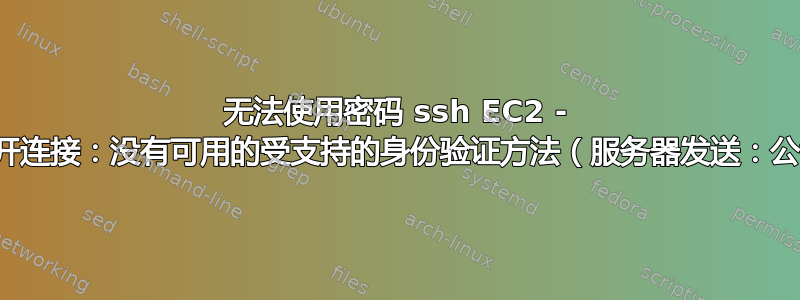
我已遵循以下步骤
https://coderwall.com/p/j5nk9w
这就是我所做的
1)$ sudo useradd -s /bin/bash -m -d /home/newuser -g root 新用户
输入新用户的密码
2)$ sudo visudo 并在root newuser后面添加ALL=(ALL:ALL) ALL
3)$ sudo nano /etc/ssh/sshd_config 在 /etc/ssh/sshd_config 中更改并将 PasswordAuthentication 设置为 yes
4)sudo /etc/init.d/ssh restart 重新启动sshd
但是当我尝试通过 Putty 登录时出现以下错误:
“已断开连接:没有可用的受支持的身份验证方法(服务器发送:公钥)”
这是我的 /etc/ssh/sshd_config 文件
# Package generated configuration file
# See the sshd_config(5) manpage for details
# What ports, IPs and protocols we listen for
Port 22
# Use these options to restrict which interfaces/protocols sshd will bind to
#ListenAddress ::
#ListenAddress 0.0.0.0
Protocol 2
# HostKeys for protocol version 2
HostKey /etc/ssh/ssh_host_rsa_key
HostKey /etc/ssh/ssh_host_dsa_key
HostKey /etc/ssh/ssh_host_ecdsa_key
HostKey /etc/ssh/ssh_host_ed25519_key
#Privilege Separation is turned on for security
UsePrivilegeSeparation yes
# Lifetime and size of ephemeral version 1 server key
KeyRegenerationInterval 3600
ServerKeyBits 1024
# Logging
SyslogFacility AUTH
LogLevel INFO
# Authentication:
LoginGraceTime 120
PermitRootLogin without-password
StrictModes yes
RSAAuthentication yes
PubkeyAuthentication yes
#AuthorizedKeysFile %h/.ssh/authorized_keys
# Don't read the user's ~/.rhosts and ~/.shosts files
IgnoreRhosts yes
# For this to work you will also need host keys in /etc/ssh_known_hosts
RhostsRSAAuthentication no
# similar for protocol version 2
HostbasedAuthentication no
# Uncomment if you don't trust ~/.ssh/known_hosts for RhostsRSAAuthentication
#IgnoreUserKnownHosts yes
# To enable empty passwords, change to yes (NOT RECOMMENDED)
PermitEmptyPasswords no
# Change to yes to enable challenge-response passwords (beware issues with
# some PAM modules and threads)
ChallengeResponseAuthentication no
# Change to no to disable tunnelled clear text passwords
PasswordAuthentication yes
# Kerberos options
#KerberosAuthentication no
#KerberosGetAFSToken no
#KerberosOrLocalPasswd yes
#KerberosTicketCleanup yes
# GSSAPI options
#GSSAPIAuthentication no
#GSSAPICleanupCredentials yes
X11Forwarding yes
X11DisplayOffset 10
PrintMotd no
PrintLastLog yes
TCPKeepAlive yes
#UseLogin no
#MaxStartups 10:30:60
#Banner /etc/issue.net
# Allow client to pass locale environment variables
AcceptEnv LANG LC_*
Subsystem sftp /usr/lib/openssh/sftp-server
# Set this to 'yes' to enable PAM authentication, account processing,
# and session processing. If this is enabled, PAM authentication will
# be allowed through the ChallengeResponseAuthentication and
# PasswordAuthentication. Depending on your PAM configuration,
# PAM authentication via ChallengeResponseAuthentication may bypass
# the setting of "PermitRootLogin without-password".
# If you just want the PAM account and session checks to run without
# PAM authentication, then enable this but set PasswordAuthentication
# and ChallengeResponseAuthentication to 'no'.
UsePAM yes
我知道这很危险,而且这不是一个公共项目。
我感谢任何帮助。
答案1
正如其他人在链接页面上指出的那样,这是一个坏主意。密码通常比使用公钥/私钥对的安全性低得多。
也就是说,如果服务器只是发送了,publickey它还没有使用新配置。请尝试重新启动sshd。
答案2
vi /etc/ssh/sshd_config编辑文件
# Authentication: LoginGraceTime 120 PermitRootLogin without-password StrictModes yes请编辑
permitRootLogin上面显示的文件中。修改后:
# Authentication: LoginGraceTime 120 PermitRootLogin yes StrictModes请使用以下命令重新启动 ssh 服务:
/etc/init.d/ssh restart
答案3
为了节省像我这样的 Ubuntu 新手的时间,较新的 Ubuntu 实例不再使用 sshd reload。相反,它要求:
sudo restart ssh
请参阅此 SO 链接了解更多详细信息:https://superuser.com/questions/214799/no-etc-init-d-sshd-file-ubuntu-ec2


